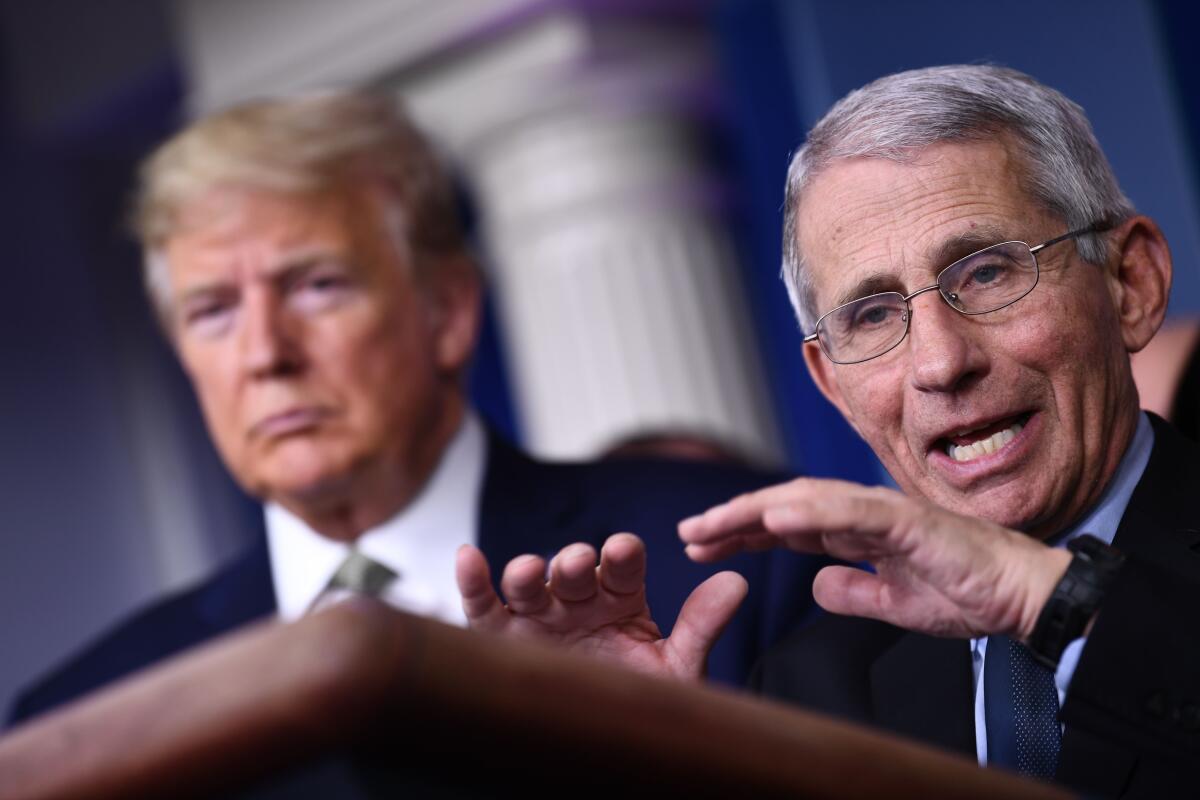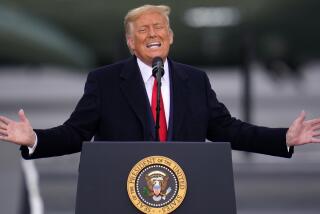Column: Trump’s daily coronavirus news briefings aren’t just excruciating. They’re dangerous

On Sunday, President Trump, absent any hard evidence, suggested that large numbers of masks were being stolen from New York hospitals, citing an unnamed facility he said had seen a huge surge in mask usage. “How do you go from 10 to 20 [thousand masks being used], to 300,000?” he said.
And he didn’t stop there. “Where are the masks going — are they going out the back door?” Trump posited. “Somebody should probably look into that, because I just don’t see from a practical standpoint how that’s possible.”
Perhaps — just perhaps — the increased volume of masks being used is correlated with the emergence of a runaway, highly contagious pandemic? I wonder if Joseph Stalin ever said during the Battle of Stalingrad: “This doesn’t make sense. Normally they only want 20,000 boxes of ammunition. All of sudden they want 300,000? Someone must be stealing the bullets.”
Is it possible there is some mask pilfering by staff? Sure. But why is the president hypothesizing about this off the top of his head? Why not use his position as the most powerful man in America to have “somebody” look into the situation before he blurts out an accusation without facts to back it up?
This is just a small example of why I hate these daily news briefings. I hate them with a kind of loathing I have not experienced before. Sure, I resent having to watch them, but that’s not a new sensation. I see it as a professional obligation, like watching the State of the Union address (which I also despise). So, it’s not the due diligence part that vexes me. It’s the experience of feeling like we’re all supposed to pretend the president is up to this challenge.
And when I say we, I do mean we. In crises, it’s normal to rally around the president and give him the benefit of the doubt. After the Sept. 11 attacks, George W. Bush’s approval rating hit 90% for a moment. It’s not that everyone suddenly agreed with, or even liked, Bush, but they were willing to put all of that aside and give the president the benefit of the doubt during a moment of peril.
For the last three years, as a conservative who just can’t board the Trump Train, I’ve been urged by people, including friends, to put my personal feelings aside and support the president. Such demands to become a cheerleader were easy to dismiss during a time of peace and prosperity as mere exhortations for partisan loyalty.
But this is a different time and it’s a real dilemma. Do you go along, even at the margins, with the fiction that Trump is up to this challenge? Or do you shine a light on his inadequacy?
I think the answer depends largely on what lane you’re in. Governors and public health officials, like the Centers for Disease Control and Prevention’s Anthony Fauci, need the support of the president to do their jobs. If that means swallowing hard and praising the president when it’s not warranted, that’s a small price to pay, at least during a crisis.
Still, it is beyond outrageous that Americans have to witness the spectacle of public health officials tailoring their responses to questions so as to not offend the president. It’s the pandemic version of Kremlinology, parsing the statements of responsible officials for hints of the truth beneath the boilerplate praise and line-toeing.
It’s even worse that we all have to put up with a president who answers questions off the cuff without regard for facts or concern for how what he is saying might be misinterpreted. Add in his incessant dedication to petty grievances, partisan puffery and chest-beating braggadocio along with all of the obligatory obsequiousness he requires of officials who know far more than he does. Together, these things create an affirmative need to call out the nonsense, because the nonsense isn’t just annoying, it’s dangerous.
Holding Trump accountable creates its own problems, of course. Some of the coverage mirrors the president’s shortcomings, making the crisis about Trump’s meanness to the media. Moreover, the president craves a foil, which is why such sizable portions of these daily sessions are dedicated to assaults on the news media.
Trump is enjoying a small bump in his approval ratings, though nothing like what George W. Bush or other presidents got during other rally-around-the-president moments. This meager improvement is partly explainable by partisanship. But it has more to do, I think, with the fact that the president is incapable of doing what other presidents do in such moments: earn the benefit of the doubt by rising to the occasion.
@JonahNRO
More to Read
A cure for the common opinion
Get thought-provoking perspectives with our weekly newsletter.
You may occasionally receive promotional content from the Los Angeles Times.











